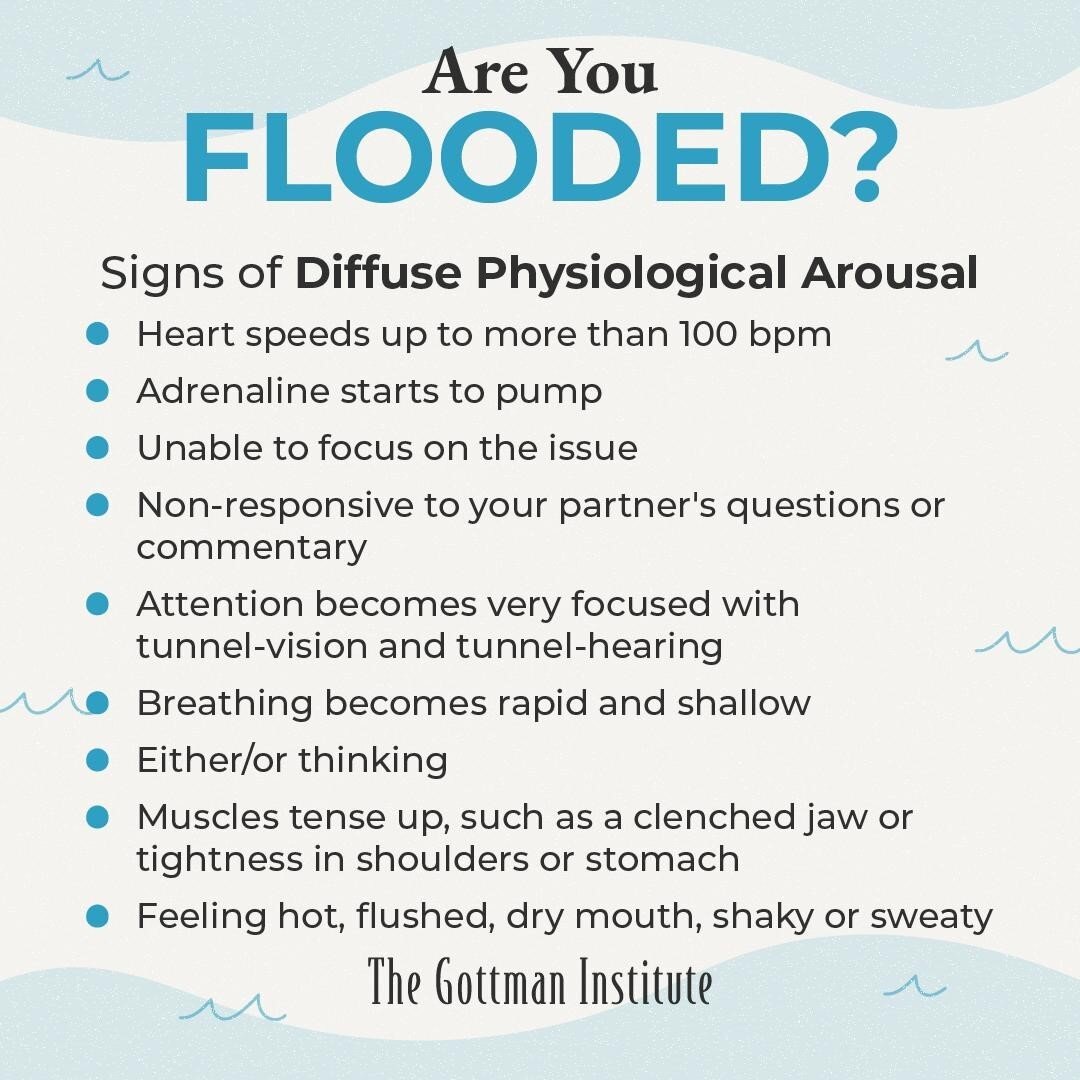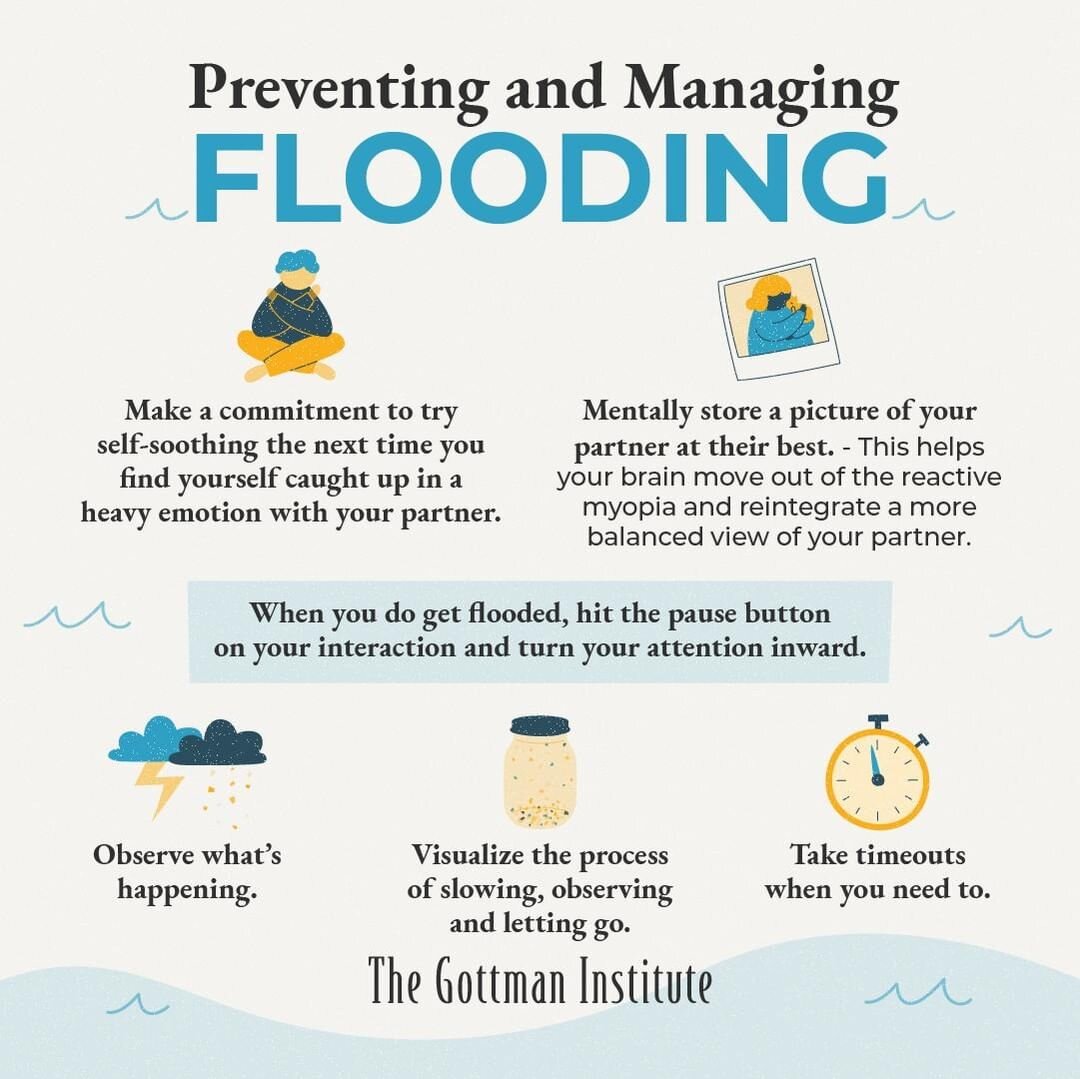What Is Emotional Flooding?
by Marissa Pomerance
There’s something that can happen with our emotions that we don’t really discuss. That most of us don’t know the word for, but can still recognize when it happens.
It’s called “flooding.”
It’s usually unconscious. It happens instantly. And it can hurt our most intimate relationships.
Here’s what you need to know about it.
What is flooding?
We may like to throw the word “triggered” around on Twitter, but flooding is what happens when we’re deeply, emotionally triggered.
It’s when we get so overwhelmed with emotion, that the emotions take over, so we completely lose access to the logical part of our brains.
According to Tanya Gaum, an Associate Marriage and Family Therapist, flooding “can look like panic levels of anxiety, sobbing uncontrollably, manic pacing, or raging at your partner as if you are fighting for your very life.”
Even seemingly small things can set off flooding, like run-of-the-mill arguments with a partner. Here’s an example:
Partner 1: It just really upset me tonight when you were on your phone while we watched this movie together. It felt like you weren’t present in the moment.
Partner 2: Is it really that big of a deal? I think you’re being a bit over-dramatic.
Partner 1: I’m not being dramatic, I just—
Partner 2: I just don’t think we need to have a whole argument about this. It’s just a phone.
Partner 1, screaming: IT’S NOT JUST A PHONE. IT’S ABOUT OUR RELATIONSHIP. AND YOU’RE NOT EVEN LISTENING TO ME! YOU DON’T EVEN CARE HOW I FEEL! SO NOW WE’RE GOING TO HAVE A WHOLE ARGUMENT ABOUT THIS BECAUSE YOU WON’T TAKE THIS SERIOUSLY!
Emotional reactions are bound to happen in an argument. But when we’re set off— when we can no longer calmly or rationally have a discussion— that’s flooding.
Why does it happen?
“Flooding happens when our sympathetic nervous system detects a threat to our safety, and begins to prepare us to either head into battle or run for the hills,” Gaum says. So flooding is a stress response that can increase our heart rate, constrict our throats and chests, and cause heavy breathing and sweating.
But what feels threatening for each of us might be completely different. Feelings of rejection and abandonment might threaten our sense of safety in a relationship; so, if a partner is emotionally distant, that might trigger flooding. Gaslighting feels threatening, and can trigger flooding.
Other times, flooding might be a simple, reactionary response that happens because “we might just need to eat or be alone or sleep,” explains Gaum. So basically, we’re just really grumpy and, therefore, easily agitated.
But for those of us who might experience extreme flooding on a regular basis, flooding can be triggered by situations that mimic our past traumas, and our brain is trying to protect us from these traumatic memories. So even if there’s not a clear threat, “a memory has triggered a developmental trauma – and all of a sudden we’re responding to our environment as that same little terrified kid who’s still waiting to be validated, comforted, and rescued from harm,” Gaum explains.
Remember our partners from above who got into a fight over a phone? Well, Partner 1 flooded because their partner wasn’t listening to them or validating their experiences. This could’ve unconsciously imitated parents who gaslighted them during childhood, telling them things were “in their head,” or they were just being “sensitive” or “dramatic,” and that their feelings weren’t valid.
And trauma-triggered flooding is extremely hard to shake. According to Gaum, “If the memory or situation causing the emotional flooding triggers unprocessed trauma related to attachment, violence, or violation, it will likely take more time and intentional effort to return to normal than if we’ve become flooded due to hunger or just being tapped out from a difficult day.”
Who can get flooded?
According to renowned psychologist and researcher, John Gottman, men are more prone to flooding than women—in fact, they experience it 80 percent more of the time than women do. Some theorize that the way we socialize men to shun their emotions leads those emotions to eventually boil over, spilling out of them in extreme ways.
But of course, it’s not just men who flood. “Emotional flooding can be experienced by anyone,” says Gaum, “but can be more common for those who live with bipolar disorder, borderline personality disorder, PTSD, or for those who are struggling with oppressive levels of anxiety, depression, or grief.” Highly Sensitive People can also suffer from flooding, as their nervous systems are generally more reactive to emotional cues. And people with ADHD and Rejection Sensitive Dysphoria, who are known to become easily overwhelmed by emotions, can also get emotionally flooded.
And since we know flooding can be triggered by trauma, it comes as no surprise that adults who dealt with dysfunctional families, trauma, or abuse as children can be more prone to flooding.
As Gaum explains, “in order to cope with family systems that have dysfunction, chaos, and intergenerational trauma, we adopt survival strategies” that last into adulthood. But as adults, “without processing early traumas and abandoning the survival strategies of our childhood, authentic connection and intimacy can sometimes feel threatening to our sense of safety, and could result in an adult-sized toddler-style meltdown,” says Gaum.
How can flooding affect our relationships?
Unsurprisingly, flooding can be incredibly difficult in a relationship where there’s any conflict or disagreement. So, marriage!
If either partner gets easily flooded, then it’s even harder to calmly and rationally work through disagreements. “When both parties are emotionally flooded, they are relating from an emotional state where empathy for each other is impossible to access, and tone of voice and facial expressions are easily misinterpreted as threatening,” says Gaum.
So when we’re flooded, we stop looking for compromise and solutions—instead, our nervous system is busy trying to protect us, and just looking to fight. Which means that flooding makes us more likely to erupt in anger, say hurtful things that, deep down, we might not really mean, lose all sense of empathy towards our partner, and refuse to take responsibility for anything we’ve done. And being on the receiving end of extreme flooding and rage can make us feel entirely helpless.
Here’s what to do about a partner who gets flooded.
Having a partner who gets flooded is, in some ways, a Catch-22. Pointing out their heightened emotional state might just set them off even more, but dealing with their blind rage is upsetting, unproductive, unhealthy, and incredibly draining.
But, it’s important to remember that “when your partner becomes emotionally flooded, they are essentially feeling unsafe,” says Gaum. So approaching them with empathy and understanding, while…difficult when we’re momentarily dealing with an illogical rage monster, is the best way to get through with them.
To do that, Gaum recommends:
First, we need to manage our own emotions: “If your partner’s emotional flooding has been triggered by an interaction or conflict with you, it’s important to check in with your own feelings, first, to avoid responding from a place of your own emotional dysregulation and flooding,” says Gaum.
Step away: During high conflict, Tanya suggests we “step away for a bit to self-soothe; gently suggesting a time out with a clearly expressed intention to pick up the conversation later will feel less threatening and destabilizing for whomever is feeling flooded than stonewalling or storming out of the room shouting, ‘I’m done with this!’”
Talk to them, gently, about therapy: Yes we know, easier said than done. But “if your partner’s emotional flooding is causing discomfort or rupture within the relationship, it’s time for a discussion about individual therapy for them and perhaps couples’ therapy for the two of you to explore your individual and relationship needs, boundaries, communication style, and unprocessed traumas,” explains Gaum. Approaching this from a personal perspective, talking about our own feelings, and explaining how this can benefit the relationship is usually the best way to go here.
Check in about their feelings: “It’s important to check in with them, check in with yourself, and get clear on the possibilities and limitations of the present moment – a simple ‘do you have the bandwidth right now to talk about…’ could be one of the easiest relationship savers out there,” Gaum suggests.
And this is what to do when WE get flooded.
According to Gaum, “when we become emotionally flooded, we are essentially craving safety at a visceral level.”
So the first step is for us to make an effort to deeply understand “who and how you are – how you operate, what your needs and boundaries are, and how you feel in your body when you’re emotionally regulated so you can physically detect when you’re flooding, and then find your way back when you need to,” Gaum says.
So, here’s an internet-friendly step-by-step guide to managing flooding in ourselves:
First, learn to recognize it: “Some people experience a faster heart rate, or they pace around the room. Others might feel irritable and snappy or, conversely, emotionally shut down and withdrawn. These are the kinds of signs to recognize that tell us to pause, breathe, and draw upon our skills for grounding and self-soothing,” recommends Gaum. So it is our job to become experts on ourselves.
Take care: We’re more likely to get flooded when we’re tired, hungry, and stressed, so “it’s your responsibility to eat when you are hungry and get more sleep. If you know you’re vulnerable to emotional dysregulation, or even mere grumpiness, right after work, then wait to engage in any significant discussions until after you’ve decompressed from the day,” Gaum explains. And taking care of ourselves also means learning how to self-soothe.
Understand triggers and survival styles: Divorcing ourselves from these adaptive survival styles is key to better managing our emotions. According to Gaum, “a common therapeutic objective for adults who are healing from developmental trauma is to get them to stop relying on the survival behaviors of their youth, and learn how to regulate their emotions through stressful situations and potential triggers.”
Set boundaries: “Creating and maintaining strong boundaries is essential for avoiding overextending yourself to the point of struggling to regulate your emotions. Creating boundaries means honoring your right to say no, building a tolerance for disappointing and being disappointed by others, and growing the courage to be loyal to your own needs despite the fear or risk of losing someone – those who deserve your time and resources will respect and stand by you,” Gaum explains.
Work with a trauma-informed therapist: For those of us who experienced trauma, Gaum recommends seeking out specialists. “A course of therapy that addresses the somatic expression of trauma is essential for identifying and processing traumas that are still trapped in the body and causing emotional flooding,” she says. And one of the newest, most modern forms of trauma-informed therapy is NARM, which you can learn more about here.
Try EMDR: Another helpful trauma-focused modality, “Eye Movement Desensitization and Reprocessing (EMDR) literally targets and then helps to process trauma that is still lingering in the body,” says Gaum.
Mindfulness: Mindfulness can help regulate our emotions in the moment—meditation, tapping, counting things are all potential methods to get the logical part of the brain working again. Gaum also recommends “walking briskly or listening to music with bilateral beats, which can help to regulate our emotions because this mimics EMDR.”
In the moment, take 20 minutes: All of the above are important methods to address flooding in the long-term, but what about the short term? Well, sometimes, just taking 20 minutes to process our emotions helps a lot. That’s how long John Gottman says it takes our nervous system to calm down.
Marissa Pomerance is the Managing Editor of The Candidly. She’s a Los Angeles native and lover of all things food, style, beauty, and wellness. You can find more of her articles here.






